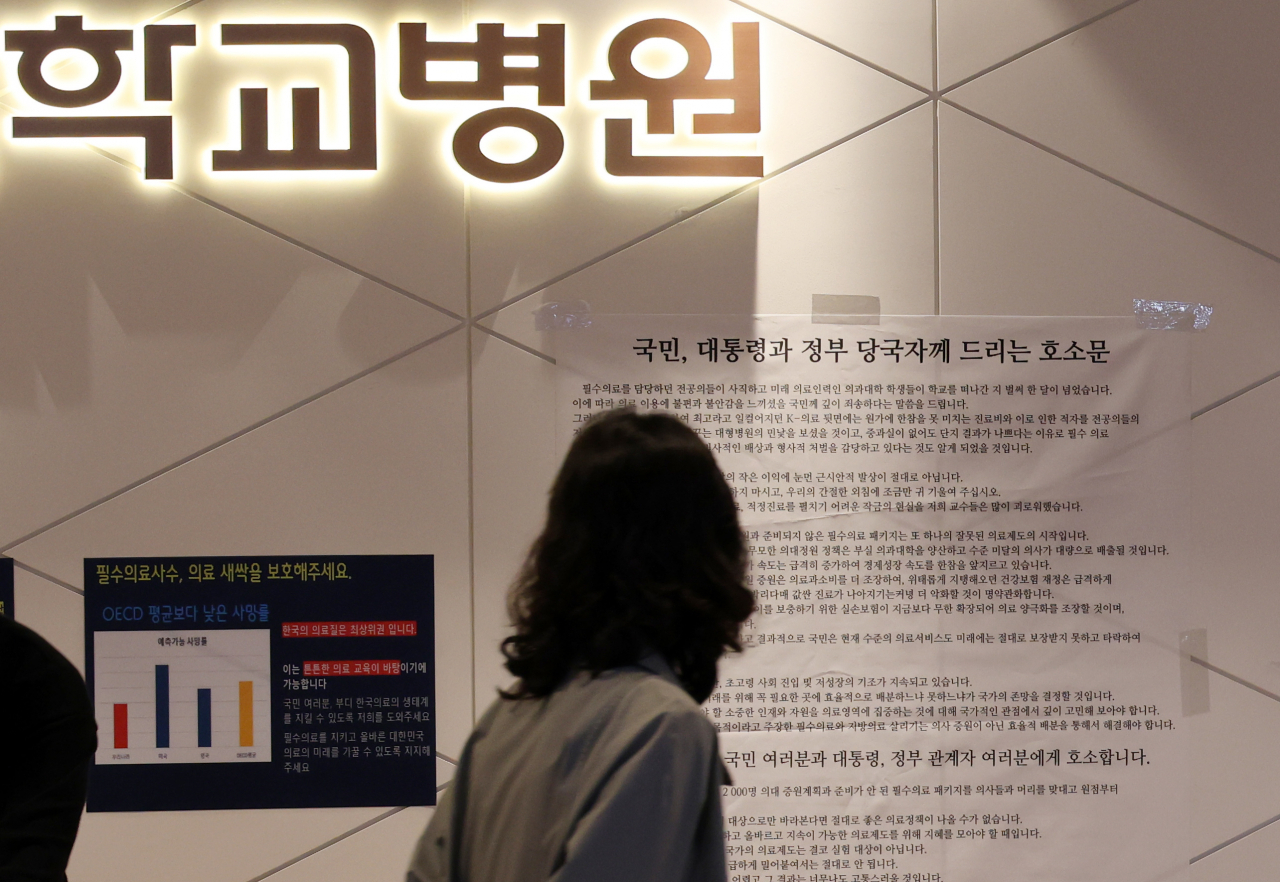 |
An appeal letter written by doctors at Chungnam National University Hospital is posted on the wall (Yonhap) |
A pan-national consultative group was launched Thursday to open a dialogue for South Korea’s medical reform but without doctors attending as they protest the government’s plan to expand the medical student quota by 2,000.
The chair of the special presidential committee Noh Yun-hong who heads the Korea Pharmaceutical and Bio-Pharma Manufacturers Association, said the newly launched group will focus on long-term tasks such as improving working conditions for junior doctors and physicians’ compensation models for essential medicine, but not on the quota.
The two major stakeholders -- the Korean Medical Association, the largest doctors’ group here, and the Korean Intern Resident Association -- have boycotted the council, demanding that the expansion plan be reviewed from the outset and that the admissions process for the 2025 academic year be halted.
Apart from Noh, the council comprises 20 experts from the private sector, recommended by 10 medical organizations and five patient advocacy groups, as well as experts in health care, economics and law. Leaders of six government agencies -- the Ministry of Economy and Finance, Education Ministry, Interior Ministry, Ministry of Justice, Health Ministry and the Financial Services Commission -- are also on the committee as government members.
Strengthening regional health care, boosting investment in essential medical fields and establishing a “safety net” to limit doctors’ criminal liability in cases of malpractice will also be put up to the table, according to Noh. The upcoming meetings will prioritize tasks that would bring tangible results to the medical field and the public, he explained.
“The current crisis that regional medical services and essential medicine (face) is attributable to the structural and complex problems of our country’s overall medical system that have remained unsolved for a long time,” Noh pointed out.
The daunting prospect that the country is set to become a “super-aged” society and the junior doctors’ walkout, which has entered its 10th week, have made the problems “more visible,” according to Noh, referring to disruptions in medical services amid continued demand.
Speaking on the committee’s significance, Noh noted that health care reform comes alongside societal factors such as education, science and technology, and regional problems, which is why representatives from different groups have banded together to reach a consensus through dialogue.
Noh added that the committee, which will serve as a social network for discussing medical reforms, aims to shape a bold new era of South Korea’s health care system and industry.
Noh urged the KMA and KIRA to promptly join the committee to discuss solutions together and share their ideas, referring to trainee and senior doctors as important stakeholders in medical reform.
Instead of joining the move for change, medical professors, who double as senior doctors at major hospitals, have now started resigning as they previously warned they would, piling pressure on patients and hospital operations. Junior doctors and medical students who have left their worksites and classrooms have yet to return as well.
Medical professors have tendered their resignations since March 25. They claim their resignations will take legal effect after the elapse of one month, even without the approval of their institutions.
The government said Thursday that only a few professors have submitted resignations and that no resignations have been accepted so far.
When asked how the government plans to bring doctors to the committee, Jun Byung-wang, a policy chief at the Health Ministry, said junior doctors should discuss improving their work environment, declining to comment further.
To ensure transparency, the committee added that it plans to disclose the results of the discussions regularly through either briefings or published reports.
The medical circle, however, expressed discomfort over the committee’s commencement.
“Granting enrollment quota flexibility (to medical schools) for 2025. But where are (the government’s) scientific and rational reasons for having 2,000 (more medical students)?” read a social media post uploaded by a doctors’ group called Medical Bamboo right after the committee kicked off, questioning the sudden shift in stance over the plan.
Meanwhile, the committee will discuss the plans for medical reforms by topic in its second meeting. It did not disclose the topic of debate nor the date of the next meeting.







